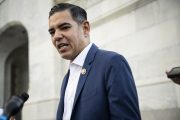
“End birthright citizenship,” Republican presidential candidate Donald Trump has demanded, as part of his overall plan to reduce the flood of illegal immigration into the United States. “This remains the biggest magnet for illegal immigration.”
It is estimated that as many as 400,000 children are born annually in the United States to illegal aliens. This makes them “natural born citizens” of the United States, according to a fairly recent interpretation of the 14th Amendment to the U.S. Constitution. Then, when these “citizens” reach their 21st birthday, they can petition for legal status for their parents.
This is why these babies born on U.S. soil to parents who are in the country illegally are known as “anchor babies.” An anchor baby provides its parents a cornucopia of welfare benefits. Even a staunch liberal such as Senator Harry Reid of Nevada once opposed the idea that the children of illegal aliens should receive automatic citizenship and reward their parent’s breaking of U.S. laws. “If you break our laws by entering this country without permission, and give birth to a child, we reward the child with U.S. citizenship and guarantee full access to all public and social services this society provides — and that’s a lot of services,” Reid once lamented.
Of course, Reid said that over 20 years ago. Now, he and the rest of the Democratic Party have figured out that adding more individuals to the welfare rolls also adds more voters for the Democratic Party.
Steve King, a U.S. representative from Iowa, is a sponsor of a House bill designed to restrict this automatic birthright citizenship, and he welcomes Trump’s taking up the issue. “I don’t have any doubt that the immigration statement that Trump put out is going to help provide momentum for a number of different pieces of immigration enforcement legislation, and especially birthright citizenship,” King said.
Charles Krauthammer dismisses the effort to end birthright citizenship. “If you are born in the United States, you are an American citizen. So says the 14th Amendment.” But is Krauthammer correct? Is that what the 14th Amendment actually says?
It certainly does not appear that the authors of the 14th Amendment intended for it to be used in such a manner as Krauthammer asserts. A proper understanding of the 14th Amendment requires an examination of the clear wording of the amendment, the historical context in which the amendment wasdrafted, and the intent of the Framers, as expressed during the legislative debate and discussion on the amendment in 1866. It is also helpful to examine how the amendment was interpreted by judges in the first few years after its adoption, before modern liberalism warped that interpretation, as it has so much of the rest of the Constitution.
The amendment states, “All persons born or naturalized in the United States, and subject to the jurisdiction thereof [emphasis added], are citizens of the United States and of the State wherein they reside.” The phrase “and subject to the jurisdiction thereof,” has, of course, been ignored by those promoting the concept of open borders. Clearly, the Framers of the 14th Amendment intended that only children born “subject to the jurisdiction” of the United States are considered natural-born citizens. This would, by the clear wording of the amendment, not include the children of illegal aliens, because they are under the jurisdiction of foreign governments, not the U.S. government.
Before the War Between the States, slaves were regarded as non-citizens by the Supreme Court decision Scott v. Sanford of 1857. To correct this court decision, and to protect the civil rights of hundreds of thousands of former slaves, Congress enacted the 14th Amendment. Without the Civil War and the resulting collapse of slavery [legally by the 13th Amendment], the 14th Amendment would not have been even considered. Its clear purpose was to confer citizenship on the former slaves, not children of illegal aliens.
Senator Jacob Merritt Howard of Michigan, an author of the 14th Amendment, said during the discussions over the effects of the amendment, “This will not, of course, include persons born in the United States who are foreigners.”
Senator James Doolittle of Wisconsin expressed concern as to how the amendment would affect the citizenship status of American Indians, because he did not want the amendment’s wording to include them. Howard assured Doolittle that the 14th Amendment did not make all American Indians U.S. citizens. His response is instructive as to the actual meaning of the words under the jurisdiction thereof, because the members of Indian tribes born in America were certainly born inside the borders of the United States.
“Indians born within the limits of the United States, and who maintain their tribal relations, are not, in the sense of this amendment, born subject to the jurisdiction of the United States,” Howard responded. “They are regarded, and always have been in legislation and jurisprudence, as being quasi-foreign nations.”
While some American Indians did become American citizens before the 20th century, it was not until 1924 that Congress passed the Snyder Act, which granted citizenship to all remaining non-citizen Indians. It strains credulity to believe that American Indians, whose ancestors had lived within the borders of the United States for centuries before the first English settlements and the founding of the American Republic, were not considered natural born citizens under the terms of the 14th Amendment, but children of illegal aliens are considered natural born citizens!
If the Indians were considered part of “quasi-foreign nations,” and thus not included in the wording of the 14th Amendment, it is reasonable to conclude that the children of illegal aliens are likewise excluded.
For years, the clear intent of the 14th Amendment to exclude certain individuals born inside the borders of the United States from citizenship was little questioned. In 1872, the California Supreme Court indicated that it clearly understood the intent of the 14th Amendment. In its ruling, Van Valkenburg v. Brown, the court declared that the purpose of the amendment was “to confer the status of citizenship upon a numerous class of persons domiciled within the limits of the United States who could not be brought within the operation of naturalization laws … whose birth, though native, at the same time left them without citizenship. Such persons were not white persons but in the main were of African blood, who had been held in slavery in this country.”
The California High Court added that, while the 13th Amendment had freed these persons of “African blood,” it had nonetheless, “left them under an insuperable bar to citizenship; and it was mainly to remedy this condition that the 14th Amendment was adopted.”
The U.S. Supreme Court ruled similarly in an 1884 case involving an Indian named John Elk. Elk desired U.S. citizenship, basing his claim upon his having been born within the borders of the United States. They denied Elk’s claim, stating that although Indians were in a “geographic sense born in the United States,” they are “no more born in the United States and subject to the jurisdiction thereof,” within the meaning of the citizenship clause, “than the children of subjects of any foreign government born within the domain of that government.” (Emphasis added.)
In an 1898 case United States v. Wong Kim Ark, the U.S. Supreme Court did rule that the children of legal immigrants in the United States were citizens. But, of course, the parents of these children had placed themselves under the jurisdiction of the United States by following the legal process to become naturalized citizens. Then, in 1982, Justice William Brennan added in a footnote in the case of Plyler v. Doe, that he saw “no plausible distinction” that could be made “between resident aliens whose entry into the United States was lawful, and resident aliens whose entry was unlawful.”
Of course, the distinction is made by the 14th Amendment, and its authors. Brennan simply chose to ignore both the clear wording of the amendment, and the contemporaneous remarks made by its authors.
King has expressed hope that Trump’s making this a campaign issue will give new life to his bill, which the House Republican leadership has so far chosen to ignore. “I’m glad Donald Trump has set this up on the table and now the American public can have an open discussion,” he said. “Sometimes the agenda in Congress is affected by the public discourse.”
King’s bill would “close a loophole” in the 14th Amendment “by clarifying that birthright citizenship is given only to the children of U.S. citizens and legal resident aliens.” The proposal would require a newborn to have at least one parent who is either a U.S. citizen, legal permanent resident, or member of the U.S. military.
Photo of Donald Trump: AP Images
Steve Byas is a professor of history and government at Hillsdale Free Will Baptist College in Moore, Oklahoma. His new book, History’s Greatest Libels, defends many persons in history he consideres unfailry maligned in both academia and in the popular culture.




